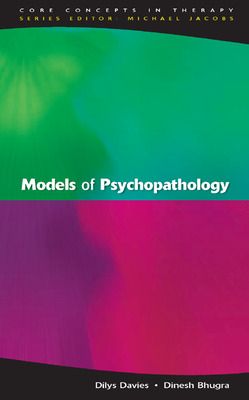Models Of Psychopathology
1st Edition
0335208223
·
9780335208227
© 2004 | Published: May 16, 2004
Models and theories of psychopathology and their associated clinical practice do not represent scientific fact so much as a variation in perspective within psychopathology itself. Several favoured models exist within any society at a given time, and…
Read More
Request Review Copy
Receive via shipping:
- Colour, print bound version of the complete text
Editor's foreword
Introduction
Psychiatric and bio-medical models
Psychoanalytic models
Attachment theory
Behavioural, cognitive and cognitive-behavioural models
Humanistic models
Sociological models
The socio-cultural model
Conclusion
References
Further Reading
Index.
Introduction
Psychiatric and bio-medical models
Psychoanalytic models
Attachment theory
Behavioural, cognitive and cognitive-behavioural models
Humanistic models
Sociological models
The socio-cultural model
Conclusion
References
Further Reading
Index.
Models and theories of psychopathology and their associated clinical practice do not represent scientific fact so much as a variation in perspective within psychopathology itself. Several favoured models exist within any society at a given time, and as well as changing historically over time, they also differ culturally between societies.
This book examines:
. the similarities, differences and points of integration in the main models of psychopathology
. how the theoretical conceptualizations underpinning these models are reflected in the theory and the clinical practice of different schools of psychotherapy
. how various models are used in everyday practice
. whether clinicians adhere to the rules of a given model or whether, in fact, there is more integration in practice than there appears to be in theoretical conceptualizations.
Models of Psychopathology is aimed at advanced undergraduates and postgraduate students of clinical psychology, counselling psychology, psychotherapy and counselling. It will also be of interest to therapy students in professional training courses and experienced clinicians who want to know more about this aspect of psychotherapy.
This book examines:
. the similarities, differences and points of integration in the main models of psychopathology
. how the theoretical conceptualizations underpinning these models are reflected in the theory and the clinical practice of different schools of psychotherapy
. how various models are used in everyday practice
. whether clinicians adhere to the rules of a given model or whether, in fact, there is more integration in practice than there appears to be in theoretical conceptualizations.
Models of Psychopathology is aimed at advanced undergraduates and postgraduate students of clinical psychology, counselling psychology, psychotherapy and counselling. It will also be of interest to therapy students in professional training courses and experienced clinicians who want to know more about this aspect of psychotherapy.

